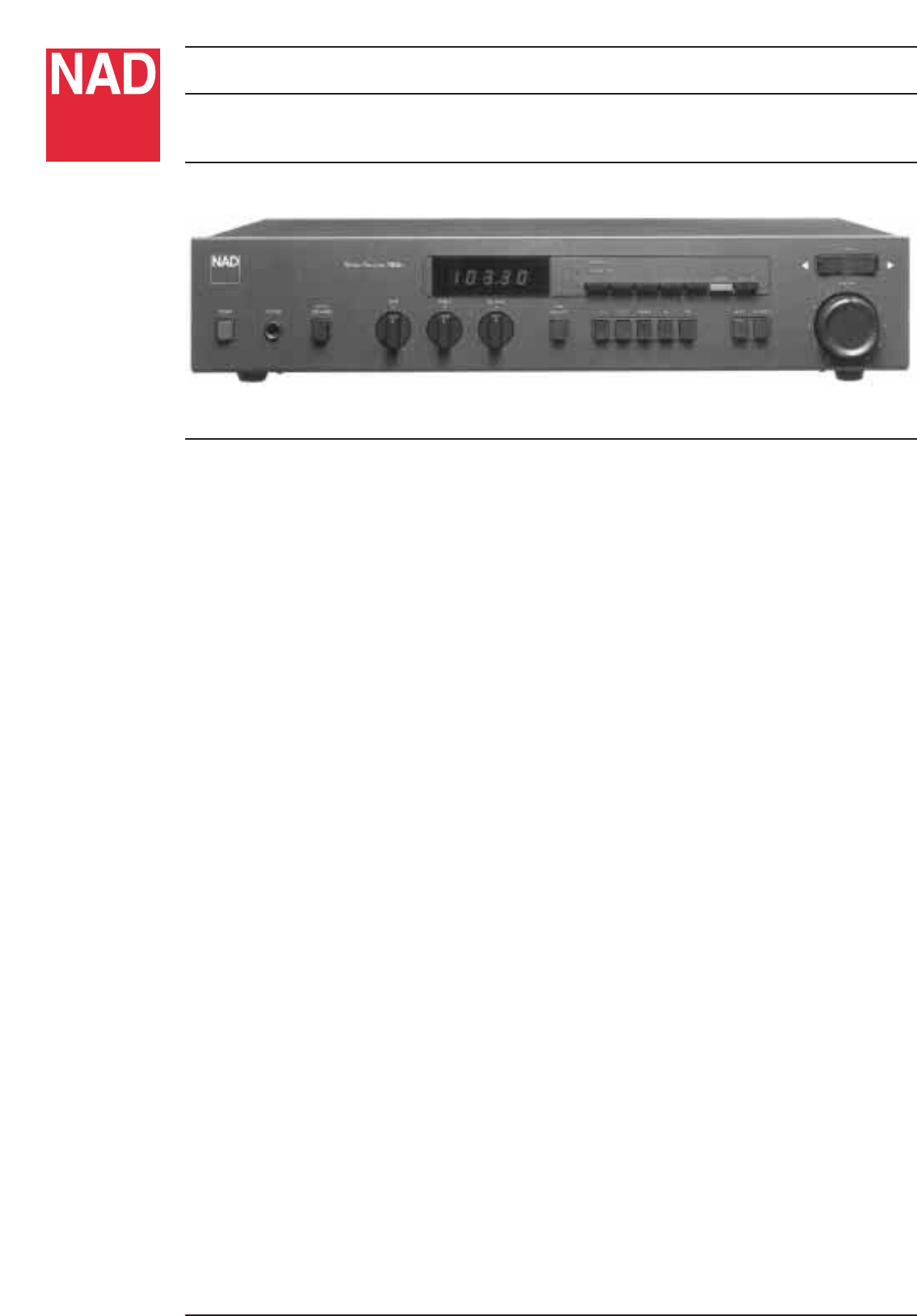7020e
Stereo Receiver
Date of manufacture : ? - Dec 89
Please note that this document contains the text from the original product brochure, and some technical statements may now be out of date
NAD’s product philosophy can be characterised in one phrase: “high-value engineering.” The compact
and economical 7225PE receiver is an outstanding example of that approach; it contains much of the
same circuitry as the 7240PE, with less output power and a substantial saving in cost
In budget-level stereo receivers, performance and power often are compromised to reduce production
cost. But NAD combines high production efficiency with superior performance by using the same circuits
in both separates and receivers. The 7225PE contains the entire 3225PE integrated amplifier plus a
sensitive, wide-range digital tuner.
The 7225PE is conservatively rated at 25 watts/ channel of steady-state power for sine-wave test tones
But with +4 dB of IHF dynamic headroom, its effective power for musical transients is considerably
greater. Power Envelope design produces bursts of up to 60 watts/channel at 8 ohms and 8 0
watts/channel at 4 or 2 ohms, ensuring clear and authoritative reproduction of the impact and sparkle
of live music. If you ever overdrive the 7225PE, Soft Clipping™ will prevent the harshness and gritty
distortion that is caused by hard clipping in conventional amplifiers.
NAD’s impedance selector allows optimum performance to be delivered into any speaker impedance
The 7225PE produces up to 15 amperes of peak current, delivering full power to impedances as low as
2 ohms. The quiet phono stage and wide-range line-level circuits, like those in the 7240PE, transparently
reproduce even the subtlest detail of every recorded sound. Infrasonic and ultrasonic filters eliminate
unwanted interference while preserving accurate response from 20 Hz to 20 kHz. Musically effective
tone controls adjust the deep bass and high treble without sacrificing clarity or midrange accuracy
Radio is not just for background music, and tuner performance should not be compromised. The
7225PE employs much of the same highly-evolved technology as the NAD 4225 tuner. A sensitive
MOSFET front end, three stages of I. F. filtering, and a PLL multiplex decoder for wide stereo separation,
provide an optimum combination of good selectivity and low distortion. In side-by-side comparisons
with other receivers, the 7225PE often pulls in weak or difficult stations with noticeably better clarity
and quieting.
NAD 7020 e Stereo Receiver The 7020e, NAD’s lowest cost receiver, is similar to the 7225PE in features
and performance, except that it is based on the 3020i integrated amplifier. It is rated at 20 watts per
channel of steady-state power with +3 dB of IHF dynamic headroom, meaning that in musical transients
it produces up to 40 watts/channel of dynamic power at 8 or 4 ohms
The 7020e shares with all NAD amplifiers and receivers a high-current output stage that, when playing
music instead of test tones, delivers full power to speakers of any impedance. Its combination of
dynamic power, Soft Clipping™, and unconstricted output current give the 7020e a characteristic ability
to drive even “difficult” speakers to unexpectedly high volume levels.
In addition to its surprisingly potent speaker-driving ability, the 7020e contains the same quiet phono
circuitry, sensitive digital tuning, wide stereo separation, sharp audio-bandpass filtering, and musically
useful tone controls that larger NAD receivers employ. The 7020e is a no-compromise product,
characterised by the high-value engineering that stands behind every NAD product.
